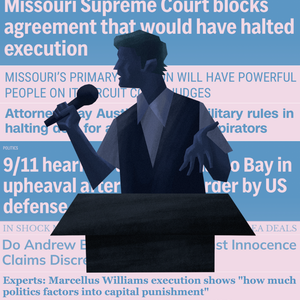A new study by law professors Eric Freedman of Hofstra and David Dow of the University of Houston found that, before the passage of the Anti-Terrorism and Effective Death Penalty Act in1996, death row inmates who filed habeas corpus petitions in federal court succeeded in overturning their convictions or death sentences about 40% of the time. After passage of the 1996 law which restricted the Courts’ power to overturn state decisions, the number of successful appeals fell to just 12% between 2000 and 2006, and the rate of successful appeals continues to decline today.
“Federal courts now grant relief at a very small rate — far smaller than they would if they had the power to correct significant constitutional violations,” said Dow. “But Congress has already deprived federal courts of their power to grant relief in most cases, even where the court believes that a significant error has occurred.” Reacting to a new law which could result in much shorter periods of review for death penalty cases, he added, “The notion that the federal government wants to accelerate executions in the face of known mistakes, and wants to do so just as DNA is becoming available in more and more cases, is mind-boggling. It will increase the risk that some state executes a person we later find to be innocent.”
The newly proposed Justice Department regulations stem from passage of the Patriot Act, legislation that gives the Attorney General new power to approve requests from states seeking mandatory deadlines for capital defendants who wish to appeal their cases to federal courts. The law requires that the Attorney General decide whether a state has a system in place to provide adequate representation for those facing the death penalty, and if so, litigation in capital cases from those states will be “fast tracked.”
Freedman voiced further concerns about the proposed regulation change, observing, “After the courts had repeatedly found that the states were not providing competent defense representation in capital cases, Congress decided to solve the problem by the simple device of having the attorney general announce that it did not exist. The attorney general can certify that the moon is made of green cheese, but that will neither make it so nor advance scientific knowledge. The way to fix capital defense systems is not to deny that they need fixing, but rather to dedicate the needed resources to improving them.”
The study by Dow and Freedman is to be published next year by the Carolina Academic Press.
(New York Times, August 20, 2007). See Arbitrariness and Representation.
Arbitrariness
Nov 05, 2024

DPI Report Provides Valuable Context for 2024 Elections
Representation
Oct 30, 2024

New Resource: Database of Capital Appeals Dismissed Solely Because of Missed Deadlines
Arbitrariness
Oct 04, 2024
